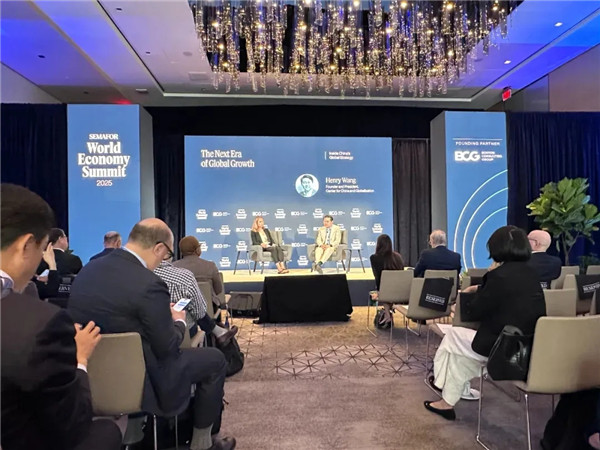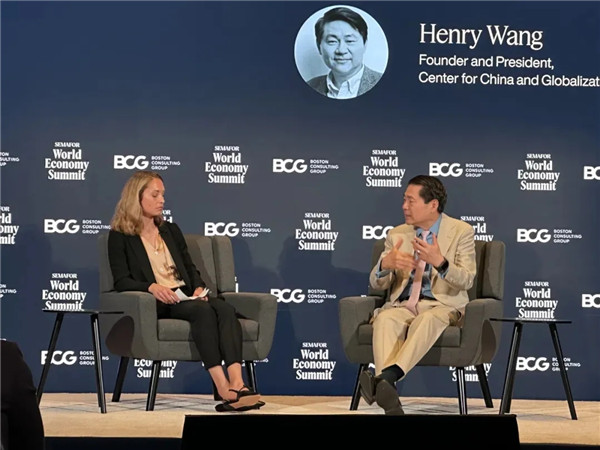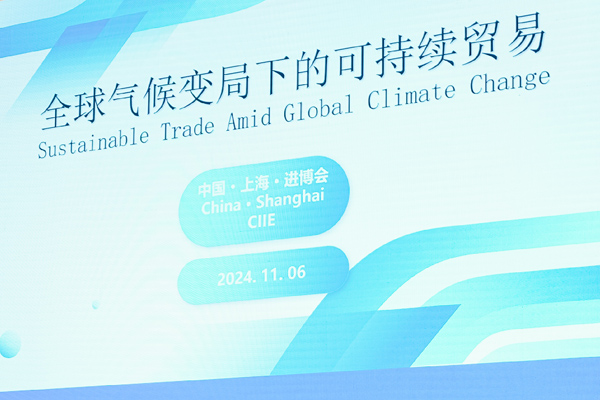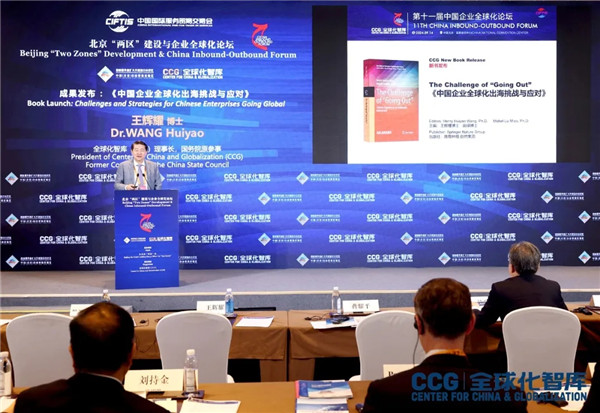Wang Huiyao speaks at Semafor’s 2025 World Economy Summit
April 24 , 2025CCG President interviewed on trade war, China-U.S. negotiations, and Chinese students in America.
▲Video | Wang Huiyao’s Interview at Semafor’s 2025 World Economy Summit
On Thursday April 24, Henry Huiyao Wang, Founder & President of the Center for China & Globalization (CCG), was invited as the sole Chinese speaker to participate in Semafor’s 2025 World Economy Summit hosted in Washington, D.C. Wang, together with CCG Secretary-General Mabel Lu Miao, also led a delegation of nine CCG experts to attend the event.
Wang was interviewed by Morgan Chalfant, Deputy Washington Bureau Chief at Semafor, during the session titled “The Next Era of Global Growth.”
Available below is a transcript of Wang’s interview.
Morgan Chalfant
Henry, thanks so much for being here. I want to start off with the topic everyone is talking about, which is the U.S.-China trade war. And I’m wondering if you think that the U.S. and China will eventually cut a deal.
Wang Huiyao
Well, I think things are starting to relax a bit. I’ve noticed that US government officials have been saying things lately that seem a bit more relaxed. Also, China recently appointed its chief trade negotiator. So, I hope that there will be more exchanges and initiatives, and we can start to see things improve. But, of course, since the US initiated this trade war, I think China is expecting the U.S. to put forward a real agenda for tackling this issue, rather than just throwing out fentanyl, trade numbers, and other details. We really need to have a sincere, comprehensive discussion, rather than just talking through the microphones.
Morgan Chalfant
If there isn’t a deal, I mean, are there other tools that China can look to the exact further pain on the U.S.?
Wang Huiyao
I think China is quite prepared already, because since the first term of Trump, China has already experienced a trade war and has actually lived with that for a number of years until now. You can see that the trade numbers have jumped from the first term to now, increasing almost 20%, while China’s dependency on US trade has decreased by about 6-7%. It used to be that 20% of China’s total trade was with the U.S., but now it’s only about 12-13%. Yet, the bilateral trade has gone up almost 20% from the first term to now. So, you can see how much China is still needed by the U.S., rather than being decoupled.
Morgan Chalfant
I want to ask you about TikTok because it’s something that I’ve covered closely. Obviously, Trump’s delayed this bill that would ban it in the U.S. or force its sale. Do you think there’s any scenario where TikTok is not a pawn in trade talks for China in the sale of that?
Wang Huiyao
I can see that President Trump has made that a topic, I mean, as part of the negotiations. From the private sector’s perspective, I would think they would be flexible to talk, but it has to be a fair deal. I also see that China has already done a lot regarding fentanyl. For example, I read an op-ed by the former Assistant Deputy Secretary of State from the Biden administration. Basically, he was saying that, since they started talking with China last year, a lot of progress has been made. The death rate from fentanyl in the US has dropped by 27%, so it’s hard to see why Trump started focusing on this. If you look at it, there’s already a good pattern with the Biden administration on this topic. Let’s continue talking instead of just raising another 10% tariff. I think things can really move forward if both sides, particularly the U.S., are serious enough to do those things.
Morgan Chalfant
Trump often expresses a fondness toward President Xi. Do you think the feeling is mutual?
Wang Huiyao
Well, he says a lot of good things about President Xi, but I think he started this trade war without real justification. The U.S. may have a trade deficit in goods, but the U.S. enjoys an enormous $1.3 trillion surplus in services trade. The U.S. dollar has been used as the global reserve currency for 60% (of global foreign exchange reserves), and the U.S. has been printing dollars to buy the world. A lot of investments flow into the U.S., and the U.S. stock markets benefit enormously. On top of that, the U.S. has great universities that attract talent from all over the world. Around 30% of AI talent in the U.S. comes from China, for example.
You can also see that the manufacturing sector in the U.S. was abandoned years ago because it was seen as too heavy, too dirty, and environmentally unfriendly. The U.S. wanted to focus on high-tech, education, biotechnology, AI, and digital industries to dominate those sectors. Now, when it comes to manufacturing. The U.S. can’t dominate all the sectors. I think we need to acknowledge that there are competitive advantages, and the heavy-duty manufacturing work that no Americans really want to do is now done in China, India, and ASEAN countries. So, trying to bring all of this back to the U.S. is not realistic, and it was not the right choice to make.
Morgan Chalfant
I’m glad you mentioned education and international students because the Trump administration has obviously taken steps to crack down on international students in the U.S. Do you think China will do anything to discourage students from coming to the U.S.?
Wang Huiyao
As far as I know, I didn’t see that happen. At the San Francisco summit with President Biden in 2023, President Xi invited 50,000 young U.S. students to come to China. And in 2024, 16,000 had already come. I think that’s really the bond between China and the U.S., and it’s where a lot of the talent in the U.S. is coming from, too. It is also good for China, as it promotes global talent circulation. So, I think it’s really unwise to cut people-to-people exchanges and target students. I think that is the wrong move. We should not do that.
As far as China is concerned, my think tank publishes a report on Chinese students studying abroad every year, and it’s still very strong. However, I do see the numbers coming down. It used to be almost 400,000, but it’s now around 300,000. But we would love to see more U.S. students going to China, as it would be good for both countries.
Morgan Chalfant
Elon Musk is obviously playing a huge role in the Trump administration, though he is expected to step back soon. He does a lot of business in China. How is he viewed in China?
Wang Huiyao
I think he’s probably saying something that’s right. You know, he really emphasises efficiency. Remember, the Tesla plant in Shanghai was designed, built, and rolling up its assembly line within one year. That’s incredible speed. Furthermore, the tariff war that President Trump imposed wasn’t just on China. About 70% of laptops come from China, and 80-90% of iPhones and iPads come from China. And all of these are made by American companies. Walmart used to purchase 80% of its supplies from China, and now it’s down to 60%.
So, I see that President Trump has already relaxed tariffs on laptops and iPads, but I think it’s not enough. President Xi actually met with 50 global CEOs about a month ago and he said that multinationals contribute one-third of China’s imports and exports. So, these tariffs are not just hurting Chinese companies, but also American, European, and multinational companies. I’ve had a big European company complain about this because they rely heavily on parts from China, especially for auto parts.
I think we’re already in a very intertwined world. It’s really silly to go back to a very primitive 19th or 18th-century mindset. The world is totally intertwined, and the U.S. is dominant in so many areas: talent, investment, U.S. dollars, digital economy, and AI. But you can’t just say, “I want to dominate everything and bring everything back to the U.S.” It’s not realistic. In one global village, we have to let everybody grow. It would be devastating for developing countries if the largest and second-largest economies got into this kind of fight.
Morgan Chalfant
Well, we’re out of time. Thank you so much.








